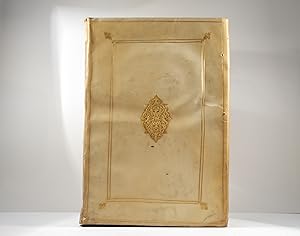Descripción
EDITIO PRINCEPS. Folio. ff. 347 (i). Greek letter, occasional Roman and Italic. Title within attractive architectural border with view of Rome, motto Ex Bibliotheca Medicea , personifications, allegorical figures, arms of the Medici and cornucopiae, charming engraved headpieces with grotesques, decorated initials. Light age yellowing, slight foxing to edges in a few places, occasional small marginal damp or water stains, light browning to last leaf, heavier to last few gatherings, ink stain to t-p affecting two letters. An exceptional, crisp, well-margined copy on thick paper in elegant contemporary possibly Dutch vellum, yapp edges, single gilt rule to outer edge, central panel with double gilt rule border, large gilt fleurons to each corner, ornate central gilt arabesque. Spine in six compartments divided by double gilt rules, gilt fleurons to each. Ex-libris of Abraham Ortelius to t-p, his ms. case or other mark to foot of titlepage, another later at head. Armorial bookplate of Piero Ginori Conti to front pastedown. C14 MSS to rear pastedown. A very good, crisp copy on thick paper of the editio princeps of Clement of Alexandria s complete extant works, edited by the humanist Pietro Vettori. A Church Father and saint, Clement (c.150-215) converted to Christianity in his youth and studied at the Catechetical School of Alexandria, where he became professor. His thought was imbued with Greek philosophy and pre-Christian cults. The Protrepticus is an exhortation to the Greeks to convert to Christianity in which Clement displays his mastery of their theology and mythology. The Pedagogus ( ) illustrates how to live according to a Christian ethics and in imitation of Christ. The Stromata ( ) is an eclectic work in three books, concerned with Greek philosophy, faith, asceticism, martyrdom, poetry and prophetic biblical books. Lorenzo Torrentino (1499-1563) was appointed printer to Cosimo de Medici in 1547. Thanks to the handsome rounded types from his Brabant press, he overcame competitors like the Giunti, and produced for the Medici Press over 250 editions in two decades. Among those who convinced Cosimo to hire an official printer was Pietro Vettori (1499-1585), who planned to publish editiones principes of Greek texts to rescue them from the ruins of time . In his dedication to Cardinal Marcello Cervino, Vettori calls this edition a monument to a saint and a very learned mind . The remarkable provenance is traced to Abraham Ortelius (1527-98), Flemish cartographer and the father of the modern atlas. Published in over 25 editions before 1600, his Theatrum orbis terrarum (1570) introduced maps into the everyday life of early modern middle classes and changed how Europeans understood world geography. As stated in the 1606 English edition, Ortelius s library was well-stocked with all kinds of books, so that his house might truly be called a shop of all manners of learning . This copy sheds light on Ortelius s interest in Greek texts; until now only one Suidas s Lexicon (Basle, 1544) has been assigned to his library, which bears a similar casemark (G/ckb/) to this copy (F/ck/). Ortelius discussed Greek editions with the humanist Isaac Casaubon and Bonaventura Vulcanius, professor of Greek and Latin at Cologne and Leiden. The C14 mss in the pastedown are taken from Sermones dominicales Parisienses and Summae virtutum ac vitiorum by Guillaume Perault (1190-1271), a Dominican preacher and writer. BM STC It., p. 186; Dibdin I, 187-88; Brunet II, 93: Prémière edition bien exécutée et peu commune . Not in Légrand. D. Moreni, Annali della tipografia fiorentina di Lorenzo Torrentino, Firenze, 1819; M. van der Broecke, Abraham Ortelius s Library Reconstructed , Imago Mundi 66 (2014), pp. 25-50; B. Op de Beeck and A. De Coster, Books and Bindings from the Library of Abraham Ortelius (1527-1598), with a Provisional Checklist , in Bibliophilies et reliures, ed. A. De Coster, et al., Brussels, 2006, pp. 374 409. N° de ref. del artículo K113
Contactar al vendedor
Denunciar este artículo
![]()



